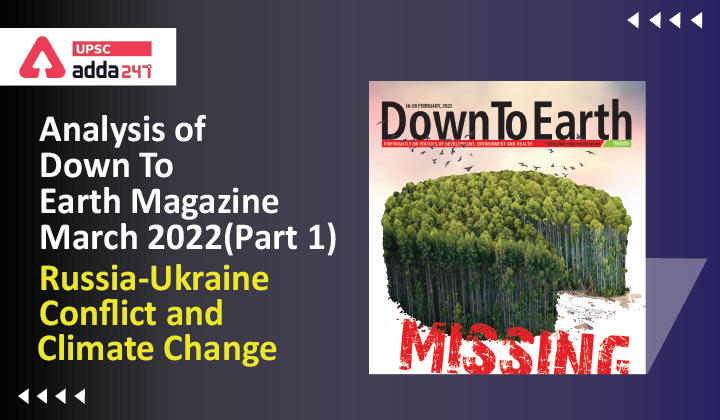Table of Contents
Analysis Of Down To Earth Magazine: ”Russia-Ukraine Conflict and Climate Change’‘
Relevance
”GS 3: Disaster Management, Environmental Pollution & Degradation, Environmental Impact Assessment (EIA)”
Context
- Recently, more than 1,000 people and organizations from 75 countries issued an open letter through the Environmental Peacebuilding Association to express their solidarity with Ukraine as it faces attacks from Russia — and their concern over the environmental and humanitarian toll of the war.
- Recently, the United Nations Intergovernmental Panel on Climate Change released a report saying that climate breakdown is occurring faster than previously thought and parts of the world will become unlivable in the next few decades if action isn’t taken now.
Key Concerns
- Russia’s invasion of Ukraine is causing air, ground, and water pollution that will be long-lasting.
- In addition, risks for contamination and health problems arise when nuclear sites are disturbed.
- The current crisis could also affect future climate policy by diverting resources and attention.
- In the short term, environmental emergencies could result from damage or disruption to energy or industrial facilities.
- But in the long term, the region could see weakened environmental governance, and the conflict’s environmental issues could go unaddressed as the government faces multiple problems.
- “Transboundary disputes” over control of resources like water or risk management of hazardous facilities could happen if Russia permanently occupies more areas of Ukraine.
Research Work Halted in the Russian Arctic
- One of the most significant impacts of the Russia-Ukraine Crisis for the future of global warming is unfolding thousands of miles away in the Arctic, where vital research on carbon emissions just came to a screeching halt.
Importance Of Research in Arctic Region
- After the Amazon rainforest, the Arctic is the second-largest carbon sink in the world, locking approximately 1.5 trillion metric tons of organic carbon—twice as much as Earth’s atmosphere currently holds—under thick layers of frozen soil and ancient plant matter called permafrost.
- The region is warming four times faster than the rest of the planet.
- This is one of the largest and most vulnerable carbon pools on the planet.
- As the Arctic heats up, the permafrost thaws, releasing stores of planet-warming carbon and methane gasses in a continuous feedback loop that threatens to turn the Arctic into a net carbon emitter, instead of a carbon sink, locking the planet on a cataclysmic climate trajectory.
- We cannot just ignore what is happening with permafrost in Russia. It’s a massive blind spot.
- An intensifying conflict in Ukraine, however, could have repercussions in the Arctic that go way beyond the permafrost study.
War displaced climate change from the political agenda
- The war and need for Russia’s resources seem to have displaced climate change from the political agenda.
- War and politics are complicating the efforts of the two biggest polluters in history — the United States and Europe — to slow down global warming.
Targeting nuclear sites poses health and environmental risks
- On February 24, Russia took control of Chernobyl, the site of a nuclear power plant where an explosion in 1986 sent radioactive material into areas nearby.
- Taking of Chernobyl “incredibly alarming,” as it stirred up radioactive dust and increased the detectable levels of radiation at the site recently.
Conclusion
Although the physical, biological, and chemical damage due to the current conflict, in short term, remains confined to Ukraine, the long term effect will reverberate far beyond. While presently Europe scramble for energy supplies to replace Russia’s fossil fuels, the long-term impact of this war could and should be increased demand for renewable energy.



 TSPSC Group 1 Question Paper 2024, Downl...
TSPSC Group 1 Question Paper 2024, Downl...
 TSPSC Group 1 Answer key 2024 Out, Downl...
TSPSC Group 1 Answer key 2024 Out, Downl...
 UPSC Prelims 2024 Question Paper, Downlo...
UPSC Prelims 2024 Question Paper, Downlo...
